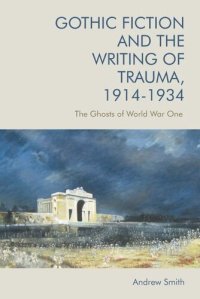
Ebook: Gothic Fiction and the Writing of Trauma, 1914-1934: The Ghosts of World War One
Author: Andrew Smith
- Year: 2022
- Publisher: Edinburgh University Press
- Language: English
- pdf
The first detailed analysis of literature and trauma in World War One
- Explores how the Gothic shaped, and controlled, cultural anxieties about the war
- Provides a unique critical revision of the figure of the ghost across a wide range of literature of the period
- Draws on the Imperial War Museum’s archives (especially for accounts of the war by less-well-known figures Dorothea Crewdson, Jack Martin and Ronald Skirth)
- Critically complicates the view of the Gothic as articulating, rather than containing, trauma
This book examines the representation of the ghost-soldier in literature published from 1914–1934, both marking the presence of trauma and attempting to make sense of trauma. Andrew Smith examines short stories, novels, poems and memoirs that employ ghosts to reflect upon feelings of loss, paralleling the literary context with accounts of shell-shock which construe the damaged soldier as psychologically missing and therefore spectre-like.
The author argues that literary and non-literary texts repeatedly deploy a form of the uncanny, familiar from a Gothic tradition, as way of reflecting upon grief. In support of this claim, he draws on fiction by well-known authors such as M. R. James, E. F. Benson, Dorothy L. Sayers, and Dennis Wheatley, alongside largely forgotten contributions to The Strand and other periodical publications such as The Occult Review.